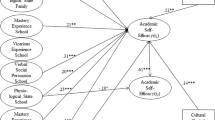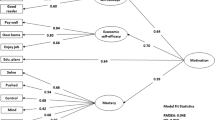Abstract
In times of dramatic social change, new career options emerge and old options may become obsolete. We investigated predictors of change in general career aspirations and of plans to attend a university of East German adolescents from 1989 (before German unification) to 1991 and 1995, respectively, after German unification. Higher pre-unification self-efficacy beliefs were associated with an increase in general career aspirations and a higher probability of switching from non-college-bound vocational training to attending a university. In addition, better pre-unification school grades and having parents who graduated from a university increased adolescents' probability to switch to a university. Furthermore, interaction effects of self-efficacy with grades and cognitive abilities appeared, indicating that for individuals with high self-efficacy, cognitive abilities became more important and grades less important in predicting the wish to pursue university studies. We concluded that beliefs in one's capabilities, and high academic abilities are important resources in vocational reorientation in times of social change.
Similar content being viewed by others
References
Amthauer, R. (1973). Intelligenz-Struktur-Test (I-S-T). Handbuch [Intelligence struc-ture test: Handbook] (4. ed. ). Go¨ttingen: Hogrefe.
Antony, J. (1998). Exploring the factors that influence men and women to form medi-cal career aspirations. Journal of College Student Development, 39, 417–426.
Anweiler, O. (1989). Bildung und Wissenschaft in der DDR [Education and science in the GDR]. In W. Weidenfeld & H. Zimmermann (Eds. ), Deutschland Handbuch: Eine doppelte Bilanz 1949–1989, (pp. 370-389). Bonn: Bundeszentrale fu¨ r Politische Bildung.
Bandura, A. (1995). Exercise of personal and collective efficacy in changing societies. In A. Bandura (Ed. ), Self-efficacy in changing societies, (pp. 1–45). Cambridge: Cambridge University Press.
Bandura, A. (1997). Self-efficacy: The exercise of control. New York: Freeman.
Bandura, A., Barbarabelli, C., Caprara, G., & Pastorelli, C. (2001). Self-efficacy beliefs as shapers of children's aspirations and career trajectories. Child Development, 72, 187–206.
Christmas-Best, V. E., & Schmitt-Rodermund, E. (2001). Adolescents' career choices in East and West Germany after reunification: Interregional and intraregional differ-ences and the role of gender. American Behavioral Scientist, 44, 1879–1898.
Coles, B. (2000). Changing patterns of youth transitions: Vulnerable groups, welfare careers and social exclusion. In J. Bynner & R. K. Silbereisen (Eds. ), Adversity and challenge in life in the new Germany and in England, (pp. 268–288). Houndmills, UK, Macmillan.
Conger, A. (1974). A revised definition for suppressor variables: A guide for their identification and interpretation. Educational and Psychological Measurement, 34, 35–46.
Cronbach, L. J. (1987). Statistical tests for moderator variables: Flaws in analyses recently proposed. Psychological Bulletin, 102, 414–417.
Elder, G., Shanahan, M. J., & Clipp, E. C. (1994). When war comes to men's lives: Life-course patterns in family, work, and health. Psychology & Aging, 9, 5–16.
Ettrich, K. U., Krause, R., Hofer, M., & Wild, E. (1996). The influence of family-related characteristics on the academic achievement of adolescents in East and West Germany. Unterrichtswissenschaft, 24, 106–127.
Gericke, T. (1994). Arbeits-und Ausbildungsmarkt im Wandel [Changes of education and labor market]. In B. Bertram (Ed. ), Gelungener Start-unsichere Zukunft, (pp. 25–52). Weinheim: Juventa.
Gustafson, S. B. (1994). Female underachievement and overachievement: Parental contributions and long-term consequences. International Journal of Behavioral Development, 17, 469–484.
Hanson, S. (1994). Lost talent: Unrealized educational aspirations and expectations among U. S. youth. Sociology of Education, 67, 159–183.
Havighurst, R. J. (1954). Developmental tasks and education. New York: Longman.
Heckhausen, H. (1988). Motivation and action. Berlin: Springer.
Heinz, W. R. (1996). Berufsverla¨ ufe in der Transformation des Bescha¨ ftigungssystems [Careers in times of transformation of the occupational system]. In S. H. Hormuth (Ed. ), Individuelle Entwicklung, Bildung und Berufsverla¨ufe, (pp. 285–357). Opla-den: Leske & Budrich.
Ho¨ckner, M. (1994). Entscheiden geistige Fa¨ higkeiten u¨ ber Berufsbildungswege [Do cognitive abilities determine occupational choices]. In B. Bertram (Ed. ), Gelungener Start-unsichere Zukunft, (pp. 189–218). Weinheim, Germany: Juventa.
Horn, W. (1983). Leistungspru¨fsystem [Performance test system]. Go¨ttingen: Hogrefe.
Juang, L. P. & Vondracek, F. W. (2001). Developmental patterns of adolescent capabil-ity beliefs: A person approach. Journal of Vocational Behavior, 59, 34–52.
Kornadt, H.-J. (1996). Erziehung und Bildung im Transformationsprozeß [Education in the process of transformation]. In S. H. Hormuth, W. R. Heinz, H.-J. Kornadt, H. Sydow, & G. Trommsdorff (Eds. ), Individuelle Entwicklung, Bildung und Berufsverla¨ufe, (pp. 201–272). Opladen, Germany: Leske & Budrich.
Lang-von Wins, T. (1997). Zum Einfluß von Selbstwirksamkeitserwartungen auf die Entscheidung fu¨ r die Karriere [On the influence of self-efficacy beliefs on career decision]. In L. v. Rosenstiel (Ed. ), Perspektiven der Karriere, (pp. 101–117). Stutt-gart: Schaffer-Poeschel.
Lent, R. W., Brown, S. D., & Hackett, L. W. (1994). Toward a unifying social cognitive theory of career and academic interest, choice, and performance. Journal of Voca-tional Behavior, 45, 79–122.
Nauta, M. M., Epperson, D. L., & Kahn, J. H. (1998). A multiple-group analysis of predictors of higher level career aspirations among women in mathematics, science, and engineering majors. Journal of Counseling Psychology, 45, 483–496.
Patton, W., Creed, P. A., & Muller, J. (2002). Career maturity and well-being as deter-minants of occupational status of recent school leavers: A brief report on an Austra-lian sample. Journal of Adolescent Research, 17, 425–435.
Pinquart, M., Silbereisen, R. K., & Juang, L. P. (2004). Buffering effects of adolescents' self-efficacy beliefs on psychological responses to social change. Journal of Adolescent Research, 19, 340–359.
Pinquart, M., Silbereisen, R. K., & Reitzle, M. (in press). Jugend im sozialen Wandel [Adolescence in times of social change]. In R. K. Silbereisen & M. Hasselhorn (Eds. ), Enzyklopa¨die Psychologie (series V, Vol. 5). Go¨ttingen, Germany: Hogrefe.
Schunk, D. H. & Ertmer, P. A. (2000). Self-regulation and academic learning: Self-efficacy enhancing interventions. In M. Boekaerts & P. R. Pintrich (Eds. ), Handbook of self-regulation, (pp. 631–649). San Diego, CA, US: Academic Press.
Trommsdorff, G. (2000). Effects of social change on individual development: The role of social and personal factors and the timing of events. In L. J. Crockett & R. K. Silbereisen (Eds. ), Negotiating adolescence in times of social change, (pp. 58–68). Cambridge: Cambridge University Press.
Author information
Authors and Affiliations
About this article
Cite this article
Pinquart, M., Juang, L.P. & Silbereisen, R.K. The Role of Self-Efficacy, Academic Abilities, and Parental Education in the Change in Career Decisions of Adolescents Facing German Unification. Journal of Career Development 31, 125–142 (2004). https://doi.org/10.1007/s10871-004-0570-9
Issue Date:
DOI: https://doi.org/10.1007/s10871-004-0570-9




